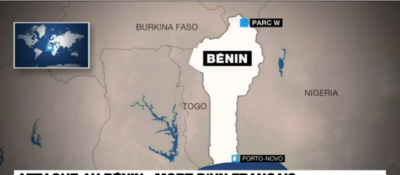
Screenshot of France24 YouTube
As part of the Accra Initiative in 2017, West African countries, like Benin, Burkina Faso, Côte d'Ivoire, Ghana and Togo, joined forces with the European Union, France and Great Britain, to collectively combat the jihadist threat in the Sahel region. By pooling efforts, this coalition of leaders from the abovementioned countries ultimately aims to better contain terrorism. In 2019, Mali, Niger, and Nigeria also joined as observer members.
Unlike the countries with which it shares 2,123 km of land borders, Benin has long been spared from jihadist threats. Burkina Faso (386 km), Niger (277 km), Nigeria (809 km), and Togo (651 km), on the other hand, have all faced so-called asymmetrical warfare for more than a decade now.
However, since May 2019, Benin has recorded an increased number of violent incursions and incidents. The most fatal attack to date, in which at least nine people were killed, was carried out on February 8, 2022. Since 2021, 20 or so terrorist attacks have been recorded on Beninese territory, as this Twitter user notes:
Le terrorisme djihadiste au Sahel s'est répandu de manière incontrôlée dans les pays du nord du Golfe de Guinée. ACLED a enregistré 26 attaques organisées dans le nord du #Bénin attribuées au (JNIM) entre le 1er novembre 2021 et le 14 septembre 2022.
— Hervé Doumbia (@almouslime) 29 septembre 2022
Jihadist terrorism in the Sahel has been spreading uncontrollably within the Gulf of Guinea northern regions. Between November 1, 2021, and September 14, 2022, ACLED (Armed conflict Location and Event Data Project) recorded 26 organized attacks in Northern #Bénin attributed to Jama’at Nusrat al-Islam wasl-Muslimin (JNIM).Hervé Doumbia (@almouslime) September 29, 2022
Sahel: “L'enlèvement des touristes français au nord du Bénin a révélé la coopération entre les différentes unités combattantes djihadistes qui opèrent dans la région.” @YGuichaoua spécialiste du Sahel et des questions sécuritaires en Afrique de l'Ouest https://t.co/pcsJeR3sY8 pic.twitter.com/KGT9Ddcl6N
— Xavier Martinet (@XXMonde) 13 mai 2019
Sahel: “The kidnapping of French tourists in Northern Benin exposed the cooperation between the various Jihadist combat units operating in this region.” @YGuichaoua expert in the Sahel and West African security matters. https://t.co/pcsJeR3sY8 pic.twitter.com/KGT9Ddcl6N
— Xavier Martinet (@XXMonde) May 13, 2019
#Sahel | Classement de l'impact du terrorisme mondial en 2022, de 0 à 10 (très fort). Le #Burkina 🇧🇫 , le #Mali 🇲🇱 , le #Nigeria 🇳🇬 et le #Niger 🇳🇪 occupent les premiers rangs.
⚠️Hausse préoccupante au #Togo 🇹🇬 (+49 places) et au #Bénin 🇧🇯 (+23 places).Source @GlobPeaceIndex . Publié le 14/03 pic.twitter.com/2gKLMjy0kS
– Wamaps (@Wamaps_news) 17 mars 2023
#Sahel | 2022 Global Terrorism Index Score, from 0 to 10 (very high). #Burkina 🇧🇫 , #Mali 🇲🇱 , #Nigeria 🇳🇬 and #Niger 🇳🇪 all ranked very high.
⚠️There has been an alarming increase in #Togo 🇹🇬 (+49 places) and #Bénin 🇧🇯 (+23 places).Source @GlobPeaceIndex . Published on 03/14 pic.twitter.com/2gKLMjy0kS
– Wamaps (@Wamaps_news) March 17, 2023
A terrorism oasis
Inscrit sur la liste du #PatrimoineMondial : Complexe W-Arly-Pendjari [extension du «Parc national du W du Niger»], Bénin, Burkina Faso, Niger pic.twitter.com/zTFCTgTd78
— UNESCO en français (@UNESCO_fr) 7 juillet 2017
Inscribed on the #PatimoineMondial (World Heritage) list: The W-Arly-Pendjari Complex [transnational extension to the “W National Park of Niger”], Benin, Burkina Faso, Niger pic.twitter.com/zTFCTgTd78
— UNESCO in French (@UNESCO_fr) July 7, 2017
Given the lack of defense and security forces for the protection of animal species, this sanctuary has become an inaccessible landmark for these forces, with armed terrorist groups subsequently taking hold there. Since 2018, jihadist groups, like Katiba Ansarul Islam and Katiba Serma, have used this as a support base to extend their reach to Benin and other West African countries. This extensive park has also experienced various conflicts associated with drought, transhumance, poaching and other phenomena.
Benin government's counter-terrorist response
To reduce the terrorist threat impact, the Benin government has implemented various measures. These include capacity-building for the Benin Armed Forces (FAB) and mass recruitment to supplement the existing defense and security forces. As announced in the current government's 2021–2026 action plan, more than 2,000 soldiers and police officers will be recruited to better cover Benin’s total land area of 112,622km². Also, as part of the Franco-Beninese partnership, France provided 20 all-terrain vehicles (Masstech) to support the Benin Armed Forces in combatting violent terrorism and extremism.
In 2022 alone, the Benin government allocated 60,609,557,000 Francs CFA (which is almost USD 100 million) to the defense sector. In 2023, a net increase of 27.82 percent has been recorded for the national Ministry of Defense budgetary requirements. For example, on April 28, 2022, the country's government informed the United Nations Secretary-General of its intention to withdraw its troops deployed in Mali as part of MINUSMA, to further strengthen its border security with Niger and Burkina Faso.
Et comme c'est l'ensemble de la société qui est impacté, c'est une raison suffisante pour que l'ensemble de cette dernière soit légitime pour participer à la recherche des solutions.
As this affects society as a whole, this is reason enough for the whole of society to legitimately take part in finding solutions.
Et donc, la société civile évidemment a un rôle important à jouer parce qu’elle est la première à être affectée des situations d’insécurité. […] Ce sont ces organisations qui sont les plus proches des populations au quotidien et donc leur rôle est vraiment central dans la prévention de l’extrémisme violent ou de l’implantation des groupes armés dans les pays de la région.
As these situations of insecurity primarily affect civil society, it undoubtedly has an important role to play […] These organizations are those closest to the people in everyday life and thereby play a vital role in preventing violent extremism and the settlement of armed groups in this region.






